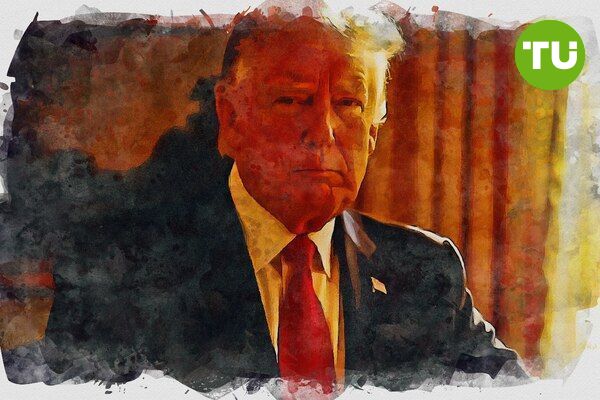Trump and cryptocurrency: where do we draw line between politics and business?
 Especially after his family acquired 60% of the shares in World Liberty Financial.
Especially after his family acquired 60% of the shares in World Liberty Financial.
After his re-election in 2024, U.S. President Donald Trump significantly expanded his involvement in the cryptocurrency sector. His cryptocurrency initiatives, combined with his political influence, have sparked both enthusiasm and disapproval. This is especially true after his family acquired 60% of the shares in World Liberty Financial.
Sudden love for Bitcoin
After losing the 2020 presidential election, Donald Trump made a famous statement calling Bitcoin a scam, saying he didn’t like it “because it's another currency competing with the dollar.”
Since then, his attitude toward cryptocurrencies has radically changed. Now, the U.S. President aligns himself with the Bitcoin community and promotes digital assets through his "cryptocurrency" administration, which includes crypto advocates like Health Secretary Robert Kennedy Jr. and DOGE leader Elon Musk.
In January 2025, just days before his inauguration, he launched the highly-promoted TRUMP meme coin. The coin's price initially surged significantly, only to fall sharply within a few weeks from $70 to $20. It is now priced around $10. Simultaneously, his wife, Melania Trump, also launched her own coin, MELANIA, which peaked at around $12 in January 2025, before dropping to $0.61 in March 2025. But that was just the beginning.
In March 2025, Donald Trump signed an executive order to create a strategic Bitcoin reserve, primarily consisting of confiscated assets. The goal is to position the U.S. as a major player in the cryptocurrency market.
The big fish: World Liberty Financial
Enter World Liberty Financial, a company founded in 2024 by cryptocurrency entrepreneurs Zak Folkman and Chase Herro. This decentralized finance (DeFi) platform aims to provide financial services based on cryptocurrencies without traditional intermediaries like banks. Folkmann and Herro had previously collaborated on several online earning projects and were involved in legal disputes and unpaid debts.
The company caught Donald Trump’s attention through his close ally and special envoy to the Middle East and Russia, Steve Witkoff. According to Witkoff, he was introduced to Folkman and Herro by one of his sons, which allowed them to gain access to Trump's circle.
In January 2025, the Trump family gained control of WLF through a holding company, acquiring 60% of the shares. This gave them 75% of the net income from token sales and 60% of the company’s operations, which amounted to about $400 million in fees. Now, the company describes the president as its inspiration, and Barron Trump as a "visionary in DeFi."
The Trump family's cryptocurrency portfolio further expanded when his sons Eric Trump and Donald Trump Jr. invested in the Bitcoin mining company American Bitcoin. This project includes a partnership with Hut 8, a major crypto infrastructure company. Under the deal, Hut will transfer all its ASIC miners to American Bitcoin Corp, retaining 80% ownership in the new structure.
In March 2025, WLF announced plans to launch USD1, a stablecoin pegged to the U.S. dollar, designed for secure cross-border transactions. USD1 will be backed by short-term U.S. Treasury bonds, dollar deposits, and other cash equivalents, aiming to combine the advantages of decentralized finance with the stability of traditional finance. It will be issued on both the Ethereum network and the Binance blockchain.
Regulatory concerns kick in
The Trump family's extensive interest in cryptocurrencies has not gone unnoticed. Ethics experts are concerned that the president’s personal business interests are now too intertwined with his public service, potentially undermining public trust. This is especially true for the TRUMP Official and WLF projects.
Because the market capitalization of the TRUMP coin exceeded $5 billion just hours after its launch, and then quickly plummeted, many considered the project to be another "pump and dump" scheme, particularly given that people close to Trump controlled a significant portion of the tokens.
Questions have also been raised about the WLF project. Is it truly DeFi, considering that its governance structure is insider-focused, undermining core DeFi principles? Many critics have expressed concern about potential conflicts of interest, calling for increased regulatory oversight and the Democrats introducing the MEME Act, aimed at preventing government officials from participating in cryptocurrency activities.
"You've got the guy in charge who is responsible for his own regulation," said Ross Delston, a former U.S. banking regulator who has acted as an expert witness on anti-money laundering issues for the government.
Delston also pointed out the likelihood that people buying WLFI tokens could become part of Trump’s political machine, turning into an "ideal tool" for governments or oligarchs abroad to "channel money to the president."
How and to what extent all of this will affect the current president remains uncertain. Despite a decline in his ratings, he still enjoys significant support among his voters, particularly within the crypto community. It is clear that attempts to challenge his growing influence in the crypto space will be difficult, though not impossible.













































































































































